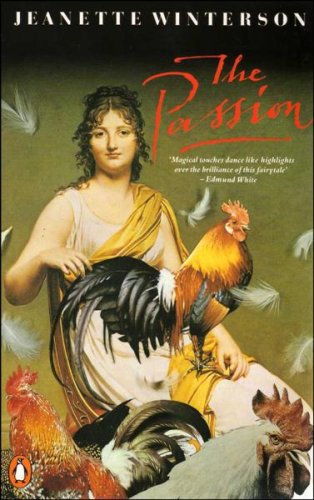Title: The Passion
Author: Jeanette Winterson
Rating: 5/5
Synopsis:
Author: Jeanette Winterson
Rating: 5/5
Synopsis:
Set during the tumultuous years of the Napoleonic Wars, The Passion intertwines the destinies of two remarkable people: Henri, a simple French soldier, who follows Napoleon from glory to Russian ruin; and Villanelle, the red-haired, web-footed daughter of a Venetian boatman, whose husband has gambled away her heart. In Venice’s compound of carnival, chance, and darkness, the pair meet their singular destiny.
My Thoughts:
„Somewhere between God and the Devil passion
is and the way there is sudden and the way back is worse.”
The
Passion by Jeanette Winterson is magical realism at its best.
I came across the book at the book fair under Waterloo Bridge and when I read
the blurb I knew I had to own it. It was the cover that caught my eyes first of
course – my edition has the most ridiculous cover ever; cocks… seriously?? –
but it was the back that sold me the novel eventually and also the fact that I
remembered I had another book by this author on my to-read list (Sexing the
Cherry).
This short little
masterpiece, which is definitely a new favourite of mine, makes a stable
attempt – and succeeds – in describing passion and its different forms. One of
our protagonists, Henri, the French peasant boy, looks up to Napoleon so much
he is ready to dedicate his whole life to Him and his cause. With a stroke of luck(?) he becomes
Bonaparte’s chicken chef and later a soldier in his army. We see him grow up
throughout the novel and as he does he starts to contemplate his
past decisions. At the end of his journey he is a changed man altogether.
We have a heroine too,
Villanelle, the daughter of a Venetian boatman, who was born with webbed feet. She is a bit of a tomboy and she has a special relationship with her city.
I especially enjoyed the parts of the novel that set in Venice; the author did
a very good job bringing the city of masks and water to life on the pages. Take a look at these couple of
passages for example:
***
„This is the city of mazes. You may set off from the same place to the
same place every day and never go by the same route. If you do so, it will be
by mistake. Your bloodhound nose will not serve you here. Your course in compass
reading will fail you. Your confident instructions to passers-by will send them
to squares they have never heard of, over canals not listed in the notes.
Although
wherever you are going is always in front of you, there is no such thing as
straight ahead. No as the crow flies short cut will help you to reach the café
just over the water. The short cuts are where the cats go, through the
impossible gaps, round corners that seem to take you the opposite way. But
here, in this mercurial city, it is required you do awake your faith. With faith,
all things are possible.”
***
Love as a topic is
visited frequently too – how could it be abandoned in a book called The
Passion? – and other than heterosexual affairs, it contains a lesbian romance
too, along with some cross-dressing which is one of my favourite tropes ever…
Beside the linear plot,
the story is littered with several curious and fantastical tales, some of which
feature side characters (Henri’s one friend, Patrick has magical eye-sight and
his other friend, Domino the midget, got hired by Napoleon to tame and tend to
his tallest horse). There are a lot of genuinely funny lines, but there is also
drama in there.
I found the whole concept
of the novel incredibly human, rich and personal. I found myself in between the lines and I’m grateful for that.
I will never stop loving magical realism, because it allows a writer to use an undending set of unusual
supplies to describe usual feelings and happenings. Jeanette Winterson has created magic and I am now richer for reading her lines.
If you want to experience a completely unique
journey too, hop on this train and enjoy the ride.











